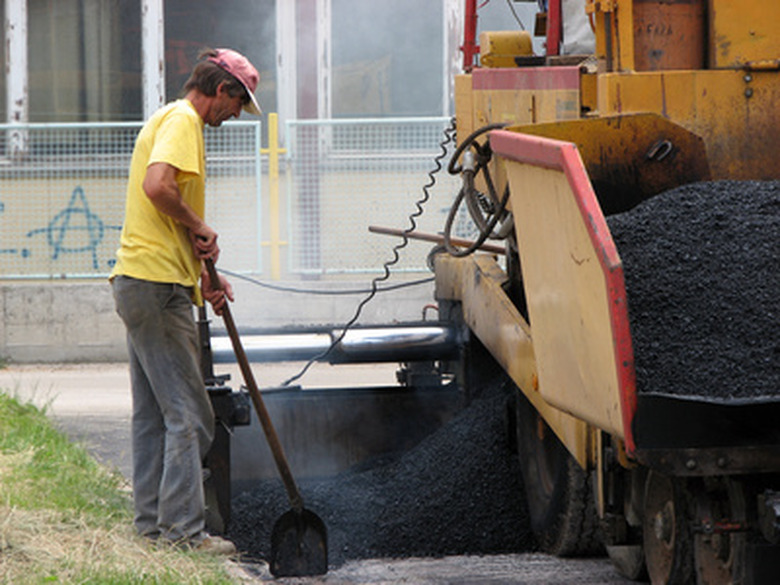Specifications For A Residential Asphalt Driveway
Designed for cars and medium-weight trucks, asphalt driveway installation materials are similar to that used on roadways, only in a thinner, less expensive mix of rock and petroleum products. An asphalt driveway gives property a finished look. Most driveways are subject to local building codes in order to have a look of continuity throughout neighborhoods.
Types
Types
There are two types of asphalt for driveways. One driveway installation comes from a hot mixture of aggregate rocks of different sizes held together with a petroleum-based binder. Special machines compact the hot mix asphalt (HMA) to the proper density and thickness for a driveway installation. The other type of asphalt mix uses a cold mixture of aggregate and binder. Unfortunately, this type doesn't hold up well in warm climates. As the temperatures warm, the binder softens around the aggregate and the surface develops soft spots.
Base
Base
No matter what type of asphalt you choose, or how thick you put it on the driveway, there must be a solid base under the driveway for it to last. While it's necessary to follow local building codes, many contractors recommend a compacted base of rock with a depth no less than 8 inches. Compacting the asphalt during installation is important as well, or the surface may give way during hot weather. The ground surrounding the driveway should drain well. The driveway should have a slope of at least 1/4 inch per foot.
Size
Size
The local zoning board establishes how wide each driveway must be, as well as the depth of the asphalt on the driveway. The amount of crushed rock base can affect the depth of asphalt required, with thicker bases requiring less asphalt. Zoning boards also set up rules for building asphalt driveways on the city's share of the apron, or the area between the sidewalk and the roadway. The zoning board establishes the size and kind of expansion joints necessary between city-owned asphalt and/or cement and the homeowner's asphalt driveway.
Sealer
Sealer
While it's possible to put a sealer on an asphalt driveway, installers typically recommend waiting at least one year before doing so. Unless the asphalt is showing signs of separating or cracking, sealing may not be necessary at all.
Warning
Warning
Itinerant driveway construction crews may pass through your neighborhood wanting to put in a new asphalt driveway, or seal and repair the existing driveway. They often do substandard work and use below-grade asphalt materials. If the driveway needs repairs, hire a reputable local contractor to do the job.
Cite This Article
MLA
Brown, Denise. "Specifications For A Residential Asphalt Driveway" sciencing.com, https://www.sciencing.com/specifications-residential-asphalt-driveway-6736118/. 24 April 2017.
APA
Brown, Denise. (2017, April 24). Specifications For A Residential Asphalt Driveway. sciencing.com. Retrieved from https://www.sciencing.com/specifications-residential-asphalt-driveway-6736118/
Chicago
Brown, Denise. Specifications For A Residential Asphalt Driveway last modified March 24, 2022. https://www.sciencing.com/specifications-residential-asphalt-driveway-6736118/
